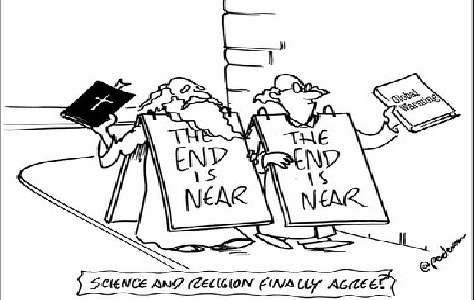Now Thomas, one of the Twelve, was not with the disciples when Jesus came. So the other disciples told him, “We have seen the Lord!” But he said to them, “Unless I see the nail marks in his hands and put my finger where the nails were, and put my hand into his side, I will not believe.”
A week later his disciples were in the house again and Thomas was with them. Though the doors were locked, Jesus came and stood among them and said, “Peace be with you!” Then he said to Thomas, “Put your finger here; see my hands. Reach out your hand and put it into my side. Stop doubting and believe.” Thomas said to him, “My Lord and my God!” Then Jesus told him, “Because you have seen me, you have believed; blessed are those who have not seen and yet have believed.”
John 20:24-29
Many, many years ago, when I was doing my masters research in atmospheric radiation balances, the concept of changing climate was one ascribed mostly to land-use and atmospheric pollution influence. It was clearly possible that altered states of atmospheric chemistry and solar radiation balances could impact on net radiation and heat balances, leading to altered climatic conditions. An overarching concern was, at that time, one of environmental poisoning and possibly the advent of the next ice-age and the sixth extinction was beginning to include the human species as a possible victim.
Over twenty years later, and having read John Gribbon’s New Scientist articles on human induced climate change, did I become aware of the real concern of imminent human-induced global warming as it hit the mainstream media. In 1998 I remember meeting an esteemed SA climate science academic at a social gathering and saying to him “so what’s up with global warming?”, and he answered in typical definitive academic style, “Well it’s complicated…”. Since joining CSAG and re-entering academia, I have quickly recognised the vast amount of research being performed on climate variability and the science, impact and consequent implications of climate change related to global warming. Of course one has to run the gauntlet of numerous questions about who is at fault, how it will play out and whether anything can be done about it, but paging through the series of IPCC reports and rubbing shoulders with climate scientists across the globe has reinforced my acceptance that, indeed, these folk know what they are talking about and they are convinced by the evidence that it is real, happening and has serious consequences.
Since then I have also experienced the convincing and personal testimonies of farmers, water managers and amateur weather watchers who attest to the changes they have observed and in many cases, recorded in their lifetimes. I have also heard many naysayers who espouse the clearly emotive view that humans could never cause such big changes and, surely these cycles have always been around, and what about the sun etc?
Giving the hundreds of public talks that I have given I also come across learned member of the public who have been exposed to some sceptical thinking and who challenge me on the hockey stick, mediaeval warming, upper atmosphere cooling and the apparent flattening of the temperature curve. Most times I can’t and won’t enter into a public debate with them, as I don’t feel confident enough to be able to represent all the science all of the time.
So have I naively become one of the climate change believers …? But it’s not a religion, I hear you say, there’s no belief in it. It’s accepting the known scientific evidence or rejecting it, or at worst, a wait and see attitude…….isn’t it? But have I read and do I understand all the evidence? No, not really.
Well, I accept that there is room for scepticism, if only to allow robust debate and more inquisitive scientific experimentation and research, and reading through some sceptic blogs, there are real scientists out there who seem to think that there is evidence and reason that will prove the IPCC stance incorrect. But will I accept their arguments? Will I be prepared to admit that there is something lacking in the current science (or even contemplate it)? Probably not. I feel in my gut (hardly a scientific proof) that disrespect and contemptuous treatment of our natural environment (and by inference, our social environment), we will reap the consequences of environmental change of massive proportions. Ecological services are being undervalued and the benefits will one day cease to flow, unless we take a moral responsibility and a physical move to action. I’m not surprised that the release of enormous quantities of GHGs is causing climate change
But if I can’t defend the climate science as represented by IPCC and the thousands of scientists who are working tirelessly to understand the problem ,am I justified in defending the consequential actions of the other thousands trying to work out ways of preventing impacts AND the thousands (like me) who are attempting to explore, encourage and oversee adaptation? I think I am, and I think I will continue, and I shall attempt to be more aware of the arguments and the evidence. You see just as I believe in the existence of Christ and his claims, while never having seen him, I also believe the scientists I have come across in this field. Which is why I should, and do, admit that “I don’t believe in (but I do accept the validity and existence of human induced) climate change”.

Peter Johnston
Posted to me by a visitor to the site in Australia..:
If there is such a wealth of scientific evidence amassing on climate change and reasons thereof, why are governments not proactive in their policies to reduce carbon emissions in order to protect their country’s biodiversity, availability of food and future of their children? Australia’s Abbott government a case in point. Big industry, and major polluters, win yet again…